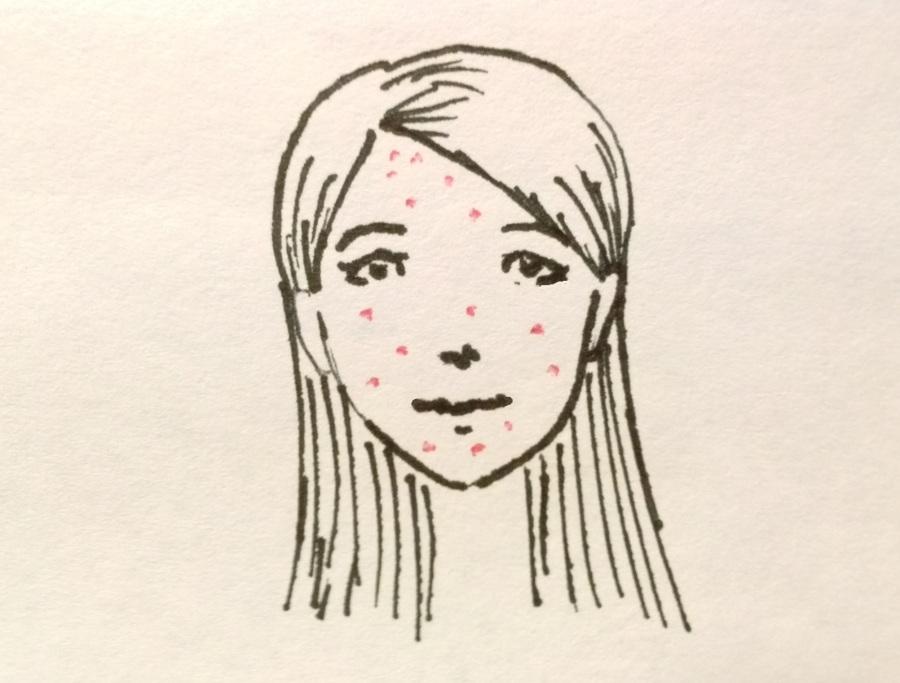A Beneath-the-Skin Perspective About What Causes Acne
September 30, 2014
Why is there so much controversy over what causes acne?
The Office on Women’s Health recommends eating a healthy diet but states that “foods seem to have little effect on acne in most people,” yet Mayo Clinic has found studies showing that “certain dietary factors, including dairy products and carbohydrate-rich foods — such as bread, bagels and chips, which increase blood sugar — may trigger acne.”
Furthermore, the Office on Women’s Health asserts that “stress does not cause acne,” but Medical News Today suggests that anxiety and stress can worsen acne by influencing hormone levels or causing binge-eating.
What do experts agree on? Most of them discount the theory that chocolate and greasy foods cause acne, since research has shown no relationship, even though many people anecdotally suggest that these foods, along with sugar and stressful days, lead to breakouts. Experts also agree that acne is caused by overproduction of sebum, or skin oils, irritation of the skin’s hair follicles, and buildup of bacteria. Hormones, especially androgens, can increase oil gland size and promote oil overproduction, therefore worsening acne. Adolescence and pregnancy are associated with the emergence and rise of acne due to surges in hormone levels. The skin condition is common; “approximately three-quarters of 11 to 30 year-olds will get acne at some time,” 17 million Americans, and even older adults (Mayo Clinic). Genetics and medications may also be linked to acne.
Recent findings show that oxidative stress can cause acne as well. Because of an inflammatory diet with a high glycemic load and high dairy intake, many people in the United States do not have enough antioxidants to combat sebum oxidation, which aggravates the skin, leading to red, inflamed pimples prone to bacterial invasion. Therefore, supplement manufacturers would suggest taking antioxidant pills. But a simpler and more natural way to have healthier skin is to make fruits and especially vegetables a significant part of your diet. To clarify what ‘significant’ means, follow the USDA’s advice: “Make half your plate fruits and vegetables.” In fact, it would be best to make half your plate vegetables and add a small piece of fruit in addition.
The internet abounds with success and failure stories about the effects of diet on acne, but this anecdotal evidence has not had much clinical research to prove or disprove it. After eliminating gluten and dairy from her diet, Jennifer Blanchard states that her ten years of adult acne ended. In addition, the heartburn, sinus and ear infections, anxiety, and stomach pains caused by her food sensitivities were also resolved. However, when Acne.org founder Dan Kern switched to a healthy caveman-style diet, complete with fruits, vegetables, seeds, nuts, meat, and no grains or dairy, his acne cleared up for about one month but returned the next month.
There is research for the prevalence of acne in different societies, though. In one study, researchers found an extreme contrast between acne prevalence in Western societies versus nonwesternized societies. While 79% to 95% of adolescents in industrialized societies are affected by acne, no cases of this skin condition were observed in 1200 Kitavan Islanders of Papua New Guinea or a population of 115 hunter-gatherers in Paraguay; the ages of these subjects ranged from 15 to 25 years. The researchers concluded that these differences could not be solely due to genetics. Lifestyle, including diet, environment, and exercise, must have been factors.
If anybody’s ever told you that nothing can be done about that nasty zit except dotting it with some ointment, chances are that he, she, or it was wrong. What you eat influences just about everything that occurs in your body, which is why you should take recommendations to avoid junk foods, processed additives, and refined sugar seriously. You can still have acne even if you eat healthily, but if you feel energetic and happy, you know that your diet has reduced the amount of stress in your body.









